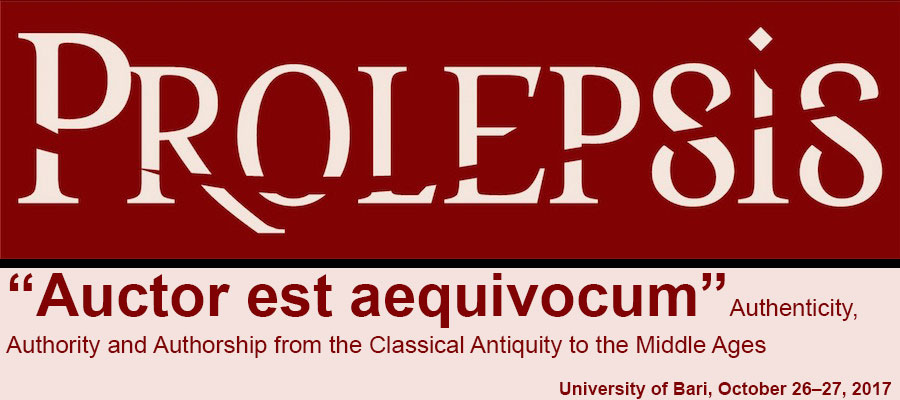“Auctor est aequivocum”: Authenticity, Authority and Authorship from the Classical Antiquity to the Middle Ages, University of Bari, October 26–27, 2017
Prolepsis Association is delighted to announce its second international postgraduate conference whose theme will be the investigation into the concepts of authenticity and authorship of literary and historical texts from the Classical Antiquity to the Medieval and the Byzantine Age.
“Auctor est aequivocum” Honorius of Autun writes in his Expositio in Cantica Canticorum (prol., PL 172, col. 348), underlining the ambiguity of the term “Auctor”. We would like use this quotation as a starting point for a discussion on the vast number of issues that derive from the concepts of authority, authorship and authenticity and on the problems that relate to their – often controversial – definitions. This year our conference is particularly keen on – but not limited to – the following topics:
- Authorship, pseudo-epigraphy and ancient ghost writers
- Corpora and spuria
- Forms of σφραγίς and autographs
- Ancient and modern interpolations
- Ancient and modern forgeries and ways to unveil them
- Borders between fakery and non authenticity
- Ancient editions and authorial philology
- Anonymous texts, adespota, unsuspicious authors and attributions in modern scholarship
- “Il copista come autore”: notable colophons, famous scribes and scribal interpolations
- Ancient terminology for authenticity and authorship (ἀλλότριος, ψευδεπίγραφος, spurium…)
- Anonymous texts perceived as authorial and authorial texts perceived as anonymous
- Catenae and centos
- Copyright and Open Access Classics
The participation in the conference as speaker is open to postgraduate students and early career researchers. The languages admitted for the presentation are English and Italian. Proposals for coordinated panels and posters are most welcome.
